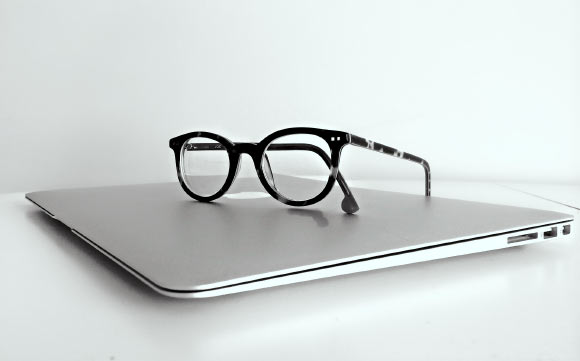Wearing blue-light filtering glasses before sleeping creates a form of physiologic darkness, thus improving both sleep quantity and quality, and is related to work engagement, and both task and non-task performance, according to a new study published in the Journal of Applied Psychology.

Guarana et al. investigated the effects of blue-light filtration on broad attitudinal and behavioral outcomes, i.e. work engagement, organizational citizenship behavior, and counterproductive work behavior. Image credit: Alexandr Borecký.
Most of the technology we commonly use — such as computer screens, smartphones and tablets — emits blue light, which can disrupt sleep.
Workers have become more dependent on these devices, especially as we navigate remote work and school during the coronavirus pandemic.
“We found that wearing blue-light-filtering glasses is an effective intervention to improve sleep, work engagement, task performance and organizational citizenship behavior, and reduced counterproductive work behavior,” said Dr. Cristiano L. Guarana, a researcher in the Kelley School of Business at Indiana University.
“This study provides evidence of a very cost-effective means of improving employee sleep and work outcomes, and the implied return on investment is gigantic,” said co-author Professor Christopher Barnes, a scientist in the Foster School of Business at the University of Washington.
“I personally do not know of any other interventions that would be that powerful at that low of a cost.”
In the study, Dr. Guarana, Professor Barnes and their colleague, University of Washington’s Dr. Wei Jee Ong, collected data from 63 company managers and 67 call center representatives at Brazil-based offices for a U.S. multinational financial firm and measured task performance from clients.
Participants were randomly chosen to test glasses that filtered blue light or those that were placebo glasses.
“Employees are often required to work early mornings, which may lead to a misalignment between their internal clock and the externally controlled work time,” the scientists said.
“Our analyses showed a general pattern that blue-light filtration can have a cumulative effect on key performance variables, at least in the short term.”
The study extends understanding of the circadian rhythm, a natural, internal process that regulates the sleep-wake cycle and repeats roughly every 24 hours.
“In general, the effects of wearing blue-light-filtering glasses were stronger for ‘night owls’ than for ‘morning larks’,” Dr. Guarana said.
“Owls tend to have sleep periods later in the day, whereas larks tend to have sleep periods early in the day.”
“Although most of us can benefit from reducing our exposure to blue light, owl employees seem to benefit more because they encounter greater misalignments between their internal clock and the externally controlled work time.”
“Our model highlights how and when wearing blue-light-filtering glasses can help employees to live and work better.”
_____
C.L. Guarana et al. 2020. The effects of blue-light filtration on sleep and work outcomes. Journal of Applied Psychology, in press; doi: 10.1037/apl0000806







